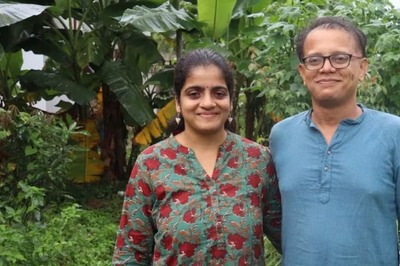
views
New Delhi: The Supreme Court's idea on Friday, favouring amicable settlement of the politically and religiously sensitive Ayodhya's Ram Janmabhoomi-Babri Masjid land dispute case through mediation, was mooted earlier as well by the top court — on March 21, 2017.
A bench headed by the then Chief Justice J S Khehar had said that fresh attempts must be made by all parties concerned to find a solution to the Ayodhya temple dispute which is a "sensitive" and "sentimental" matter.
However, the contesting parties were hesitant to support the suggestion made by the then bench, which also comprised Justices D Y Chandrachud and S K Kaul.
The matter later came up for hearing before a bench, headed by his successor Justice Dipak Mishra, which tried to take forward the appeals against the 2010 Allahabad High Court judgment, delivered in four civil suits, that the 2.77-acre land in Ayodhya be partitioned equally among the three parties — the Sunni Waqf Board, the Nirmohi Akhara and Ram Lalla.
Justice Misra, the then chief justice along with Justices Ashok Bhushan and S A Nazeer, had refused to refer the matter before a five-judge Constituiton Bench, had treated it as case of title dispute over a property.
The idea of settling the dispute through mediation as suggested by a bench headed by Justice Khehar was revived by a bench headed by present Chief Justice Ranjan Gogoi.
While several developments connected with the dispute, including the recusal of judges like Justices U U Lalit and N V Ramana, delayed the proceedings, the bench headed by Justice Gogoi on February 26 sprang a surprise by toing the suggestion mooted by the apex court in March 2017.
The current bench, also comprising Justices S A Bobde, D Y Chandrachud, Ashok Bhushan and S A Nazeer on February 26, 2019, again asked the contesting parties to explore the possibility of amicably settling the decades-old dispute through mediation, saying it may help in "healing relations".
Even if there is "one per cent chance" of settling the dispute amicably, the parties should go for mediation, the bench had suggested.
The suggestion for mediation was mooted during the hearing when both the Hindu and the Muslim sides were sparring over the veracity of documents related to the case which were translated by the Uttar Pradesh government and filed with the apex court registry.
"We are considering it (mediation) very seriously. You all (parties) have used the word that this matter is not adversarial. We would like to give a chance to mediation even if there is one per cent chance," the bench had said.
"We would like to know your (both parties) views on it. We do not want any third party to make a comment to jeopardise the entire process," the bench had said.
While some of the Muslim parties had agreed to the court's suggestion on mediation, some Hindu bodies including the Ram Lalla Virajman opposed it, saying several such attempts have failed in the past.
"Do you seriously think that the entire dispute for so many years is for property? We can only decide property rights but we are considering the possibility of healing relations," the bench had said.
Even in 2017, the bench headed by Justice Khehar had said that such religious issues can be solved through negotiations and offered to mediate to arrive at an amicable settlement.
"These are issues of religion and sentiments. These are issues where all the parties can sit together and arrive at a consensual decision to end the dispute. All of you may sit together and hold a cordial meeting," the bench had said.
"You must make fresh attempts to arrive at a consensual decision. If required, you must choose a moderator to end the dispute. If the parties wants me to sit with mediators chosen by both the sides for negotiations, am ready to take up the task. Even the services of my brother judges can be availed for the purpose," the bench headed by Justice Khehar had said.
The present bench had said it wanted to explore the possibility of mediation to utilise the time till the next date of hearing by which translated documents would be ready if the need would arise for adjudicating the matter or merits.




















Comments
0 comment